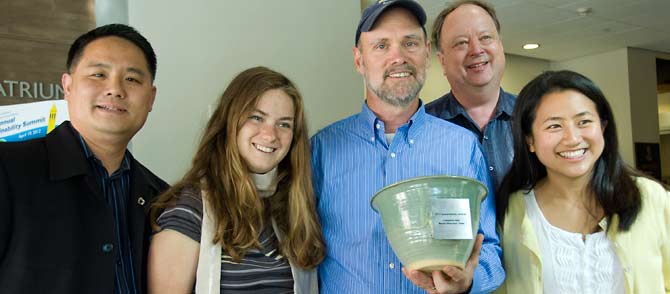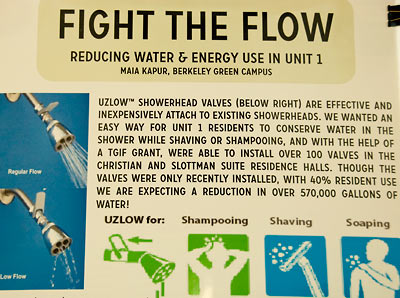Sustainability Summit marks progress toward ever-greener campus

It was nearly a decade ago that Berkeley students held their first Sustainability Summit to showcase green projects in zip code 94720. At the ninth iteration of that event, held April 19 in Sutardja Dai Hall, progress in “greening” the campus was everywhere evident — from the sheer number of student projects now in play to the metric tons of greenhouse gases not being emitted, thanks to a gradual but steady rollout of baseline sustainability assessments, strategic plans, building upgrades and tools to realize serious conservation.

Chancellor Robert Birgeneau, who offered introductory remarks and announced the day’s honorees, noted that at his first Sustainability Summit, in 2005, the Chancellor’s Advisory Committee on Sustainabilityhad just completed its first campuswide sustainability assessment, establishing a baseline against which institutional progress could be measured. Students’ passion since then, he added, has led to significant institutional change.
Five standout teams and individuals took home Sustainability Awards from CACS, which sponsors the annual event: Cal Dining, for its leadership role both on campus and among higher-ed food-service organizations; the Campbell Hall team, for helping the campus divert nearly 66 tons of waste, otherwise destined for landfills, in anticipation of the building’s demolition; Domenico Caramagno, Sutardja Dai Hall’s facilities manager, for efforts to quantify and boost waste-, energy-, and water-saving opportunities in the building; and students Morweena Rowe and Sruti Bharat for their work on projects to green the campus throughout their undergraduate careers.
A new round of Green Fund Grants laid the groundwork for continued greening of the campus. Birgeneau announced the winners of six creatively named student-initiated projects — from “Weed ‘Em and Reap” (a project to do battle with invasive plants along Strawberry Creek) to “To-Go or Not To-Go” (to study and test a reusable food-container program in Cal Dining facilities).
The summit began with a poster presentation on student-initiated sustainability projects at Berkeley. It ended with a panel discussion on post-graduation careers in fields related to sustainability.
One recent Cal alum, now employed by the EPA’s Office of Pollution Prevention and Solid Waste, recounted how hands-on projects at Berkeley fueled her passion for sustainability and ultimately gave her an advantage as a job candidate.
“I was fresh and green” compared to the competition, she said, but ultimately got the job thanks largely to her experience at Berkeley, like “digging through the trash” to quantify campus trash output.
Commenting on progress highlighted at the summit, attendee Karl Brown, a UC energy-efficiency expert, pointed to one of newest campus programs to roll out — the myPower building dashboard program — as “truly groundbreaking.” Energy consumption has been effectively “free” to campus units in the past; now there’s “a serious incentive to save,” he said.
The Sustainability Summit came in the midst of Cal Earth Week, whose events and programs ran from a kickoff concert Monday night by the local indie band Big Tree to a “Little Green Book” featuring discounts at local green businesses.
